Visit our Office
Gillis Family Dentistry
1108 E Ohio St
Clinton, MO, United States
64735



Dr. Krystal Gillis, Dr. Robert Sexauer and our wonderful team would like to thank you for visiting our
website. We are honored that you are considering our practice for your oral health needs and we
sincerely hope to exceed your expectations. We offer a full range of dental services for patients of all
ages. Our office is conveniently located in Clinton, MO, serving residents of Henry County and beyond.
The most important aspect of our practice is our holistic approach and commitment to your wellbeing. We
do not simply want to correct the symptoms of oral disease without addressing the root cause. Instead,
our goal is to help you achieve and maintain optimal health. It’s not just about your teeth; it is about you,
your whole health, and your quality of life.
Patients of all ages are welcome in our office. Whether you are seeking full mouth reconstruction,
orthodontics, cosmetic dentistry, or pediatric dental care, you can count on us. Don’t expect us to lecture
you about flossing and rush you out the door. We don’t judge, we educate. No one wants cavities, gum
disease, bad breath, toothaches, or other dental problems. In most cases, the underlying cause of poor
hygiene is lack of understanding. Instead of telling you what to do, we explain the current condition of
your oral health, what caused problems to develop, and ways that we can work together to solve them.
In our office, dental procedures are performed using gentle techniques and biocompatible materials. Our
philosophy is that dental care should improve not only your appearance, but also your overall health,
wellbeing, and quality of life. When you come to our office, you can feel confident knowing that we will
take good care of you. We want to be your partners in oral health and beautiful smiles. Call us at (660)
885-6933 and schedule your appointment today.

Dr. Gillis looks forward to serving this community for many years to come, not only as a hardworking dentist but as an active and involved citizen.

Dr. Robert and his team take pride in providing exceptional customer service with a consistently high level of care.

Amy works with patients to coordinate their treatment plans in ways to maximize their insurance benefits.

Teresa has 20 years of experience as a medical assistant and in medical administration. Her experience has been a great addition to our front desk and scheduling.

Elizabeth’s goal is to educate, empower, and encourage you to reach your optimal oral health.

Mechelle stays current with continuing dental education classes - a commitment she takes seriously to helping patients maintain their dental health.

Kelsey worked for both a general dentist and an oral surgeon’s office in the Kansas City area for four years prior to moving back to Clinton where she was born and raised.

Shawnda’s future consists of further educating herself in Expanded Functions as a dental assistant and eventually becoming a dental hygienist.

Susan has years of experience in surgical dentistry and emergency medicine. Susan’s “can-do” attitude keeps us moving on schedule and her skill is a great asset to our office.
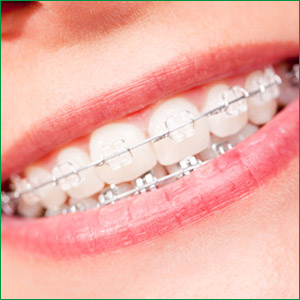
We offer a variety of orthodontic options for patients of all ages. Whether you are a child in need of interceptive orthopedics or an adult seeking a discreet way to straighten teeth, you’ve come to the right place. Dr. Krystal Gillis and Dr. Robert Sexauer have over 35 years of combined training and experience, and they would love to help your smile straighten up!
Dr. Krystal Gillis is a Senior Master Affiliate provider of Fastbraces. Technology in these brackets allow the process of straightening the roots of the teeth to an upright position from the beginning of treatment by using a patented method for restoring the morphology of the alveolar bone, and a patented method for treating orthodontitis of the gums (gingivitis around crooked teeth). One of the key benefits to using FASTBRACES® for straightening teeth is that patients see a noticeable difference in their teeth within a matter of days and some could be out of the braces in about 100 days. Decreased reported pain is another reason behind the advantage of FASTBRACES® over other braces.
SureSmile 360 and Clear Correct are modern solutions to straightening your teeth without wires. Clear, smooth and durable plastic is custom moulded into a set of nearly invisible aligners that snap into place over your teeth. Every three weeks, you exchange your aligners for a new set that straighten your teeth to their correct positions.
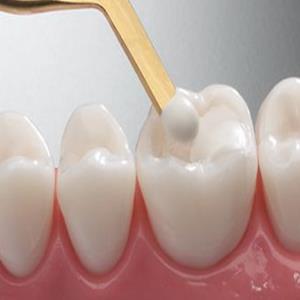
We use the latest composite resin material for fillings that are both beautiful and bio-compatible. The process is simple and takes just one visit. After the decayed tooth material has been removed, the dentist applies and shapes the resin, and then uses a curing light to harden it.
A dental filling is a treatment to restore the function, integrity, and morphology of missing tooth structure resulting from caries or external trauma. A filling helps prevent further dental decay closing off any spaces where bacteria can enter a tooth. When caught early enough, cavities can be treated easily and painlessly. If not treated a tooth may require a root canal or extraction.
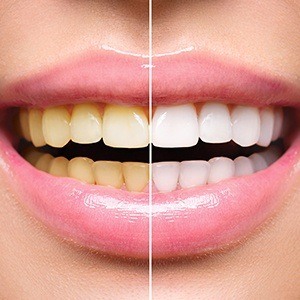
The simplest and quickest way to improve the appearance of your smile is teeth whitening. A single appointment, or a couple of weeks of daily at home treatment, can lighten your tooth color by several shades. Bleaching is most effective for stains and discoloration that occur over time.
When enamel is worn away by acid, teeth begin to look worn, old, and discolored. Teeth whitening can restore the look of your smile towards its former glory even after just one session.
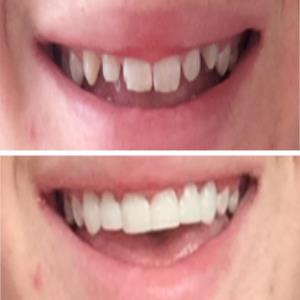
Bonding is among the easiest and least expensive of cosmetic dental procedures. Composite resin is a tooth colored resin which can be shaped and polished to match the surrounding teeth. Most often, bonding is used for cosmetic purposes to improve the appearance of a discolored or chipped tooth. It also can be used to close spaces between teeth to make teeth look longer or to change the shape or color of teeth.
Sometimes, bonding also is used as a cosmetic alternative to amalgam fillings, or to protect a portion of the tooth's root that has been exposed when gums recede. Unlike veneers, which are manufactured in a laboratory and require a customized mold to achieve a proper fit, bonding can be done in a single visit. The procedure is called bonding because the material bonds to the tooth.
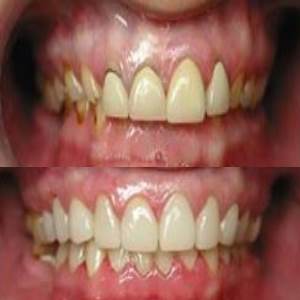
A veneer is an extremely thin piece of porcelain that is affixed to the surface of a tooth. It can be used to adjust the size, shape, length, natural color, and even the rotation of a tooth. This is a great solution for essentially healthy, yet unattractive teeth. Weak or damaged teeth may require crowns instead.
Porcelain veneers resist stains better than resin veneers and better mimic the light reflecting properties of natural teeth. Getting a dental veneer usually requires three trips to the dentist – one for a consultation and two to make and apply the veneers.
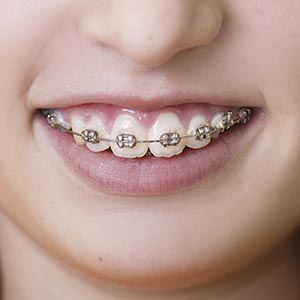
Periodontal health is one of the primary focuses of our practice, as it is vital for oral and overall health. Signs of periodontal disease include red swollen gums which bleed easily and pull away from the teeth, tooth mobility, and bad breath. Our interest lies in diagnosing and treating the actual disease, rather than simply masking the symptoms. Our goal is to eliminate the inflammation and harmful organisms. Simply restoring the damaged or destroyed tissues, without eradicating the cause, would not actually be a solution, because problems will return. We provide comprehensive treatment to eliminate the disease and restore the damage, for lasting good health.
Patient education is one of the most important services that we provide. We will explain the current condition of your oral health, and we will discuss what can be done to improve it. Your daily habits and nutrition are an important part of the treatment plan. We will work with you to help you understand how the disease took hold in the first place, which is the key to preventing recurrence.
Gum disease causes inflammation and eventual destruction of oral tissues, but that is not the most dangerous aspect of it. The health ramifications of chronic degenerative disease are not confined to the mouth. Researchers have linked gum disease to a wide variety of very serious health conditions.
The best-known disease of concern is coronary artery disease, which is the number one killer of men and women in the United States. There is a direct link between oral and coronary diseases. In fact, studies performed at Harvard have found oral bacteria present in plaque buildup on the walls of arteries. In one particular study, 100 patients were evaluated and every one of them had organisms associated with oral disease in their arteries.
In addition to heart disease, periodontitis has been associated with a number of other conditions. These include fibromyalgia, pre-term births, as well as rheumatoid arthritis, colitis, and virtually any other condition with a name ending in “itis,” which indicates inflammation. Prevention and treatment of periodontal disease is important for your overall health and quality of life, as well as your oral health.
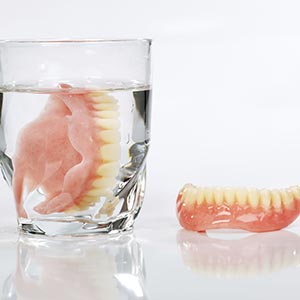
Edentulism (the loss of natural teeth) is an unfortunately common dental problem. The traditional solution for complete tooth loss in the upper or lower arch is a traditional denture. Although these appliances are known for being uncomfortable and difficult to stabilize, we have much better technology and materials today than in the past.
When designed by a skilled, experienced dentist such as Dr. Robert Sexauer or Dr. Krystal Gillis, dentures can be a beautiful, healthy, economical solution. We use only the highest quality and most biocompatible materials available for both the acrylic base and the teeth.

Dr. Robert Sexauer, Dr. Krystal Gillis, and their team have a common priority, and that is your wellbeing. Everything that we do here in our office is centered on your overall health, not just teeth. We take great care to use biocompatible materials and gentle, conservative techniques, with a focus on healing.
We do not use nickel, or base metals that are common allergens and raise other health concerns. For example, in some instances, metal based materials may be an inexpensive, functional restoration, but we do not believe it is the healthiest choice. We only offer products, services, and materials that we believe in. Therefore, we primarily use porcelain and composite resin materials but always use materials which are extremely biocompatible. We also select our sealants and restorative resin materials carefully, choosing those with high quality.
When you visit our office for dental exams, we do a bacterial culture test to determine exactly what microorganisms are living in your mouth, including below the gumline. This is an excellent diagnostic tool, which helps us determine how healthy, or unhealthy, your gums actually are. From there, we can design a personalized treatment plan, either curative or preventive.
When you visit our office, you can be rest assured that we will take good care of you. We take pride in providing high quality, personalized dental care for residents of Clinton, MO and beyond.

We love children! We like to start seeing little ones early, so that we can monitor their oral development, and they can become familiar with the office and staff. The best time for the first appointment is within six months of the eruption of the first tooth or by the age of one. One of the most important benefits of early dental care is teaching children good habits and a positive attitude toward dentistry.

When you visit our office for dental exams, we do a bacterial culture test to determine exactly what microorganisms are living in your mouth, including below the gumline. This is an excellent diagnostic tool which helps us determine how healthy, or unhealthy, your gums are. From there, we can design a personalized treatment plan.
A routine dental exam and cleanings are typically recommended every six months for a healthy dental patient. At a routine dental exam and cleaning, our team with thoroughly clean your teeth by removing any calculus or plaque deposits and surface stains. We will also check for signs of tooth decay, excessive tooth wear and gum disease. We perform an intraoral and extraoral cancer screening. Dental x-rays may be taken to provide a more detailed summary of your oral health condition.
Another preventive measure we take is the applications of dental sealants. Sealants consist of a plastic material that is placed on the chewing surface of the permanent back teeth to help protect them from bacteria and acids that contribute to tooth decay.

Were it possible to help our patients maintain their healthiest smiles without having to provide restorative dental care, we would love that. We understand, however, that there will be individuals who come to our practice in need of some level of repair. Using tooth-colored, biocompatible materials for tooth restorations like crowns and bridges, we attend to both the aesthetic and oral health needs of the individual patient.
Dental crowns are restorations that are not placed inside a tooth, but around a tooth and may be warranted if more than half of a tooth’s structure has sustained damage. This damage may be in the form of a fracture, break, or wear and tear. The placement of a dental crown allows your dentist to preserve the natural structure that remains after a tooth has been damaged. This preservation takes place through the crown’s ability to absorb much of the force that is applied in chewing.
Treatment with a dental bridge differs from dental crown treatment in that a bridge is intended to replace a missing tooth rather than save a natural tooth that has been damaged. Most often, bridges are designed to be fixed, which means the appliance remains in place at all times. A fixed bridge is stabilized by the teeth on each side of the empty space. In between these two crowns lies a pontic, or artificial tooth.

Root canal is a treatment to repair and save a badly damaged or infected tooth instead of removing it. The procedure involves removing the damaged area of the tooth (the pulp) and cleaning and disinfecting it, then filling and sealing it. The common causes affecting the pulp are a cracked tooth, a deep cavity, repeated dental treatment to the tooth or trauma to it. The term "root canal" comes from cleaning of the canals inside the tooth's root.
Decades ago, root canal treatments were painful. With dental advances and local anesthetics, most people have little if any pain with a root canal today.

If a tooth has been broken or damaged by decay, your dentist will try to fix it with a filling, crown or other dental treatment. But when there's too much damage for the tooth to be repaired, the tooth may need to be extracted — or removed — from its socket in the bone. Extracted teeth may be replaced with bridges, implants or partial dentures.
Baby teeth may also need to be extracted if they are interfering with the permanent tooth’s growth and development. Wisdom teeth, also called third molars, are often extracted either before or after they erupt in the mouth. They commonly come in during the late teens or early 20’s. They need to be removed if they are decayed, infected, or if there is not enough room in the mouth.

A dental implant is a titanium post (like a tooth root) that is surgically positioned into the jawbone beneath the gum line that allows your dentist to mount replacement teeth or bridge into that area. An implant doesn't come loose like a denture can. Dental implants also benefit general oral health because they do not have to be anchored to other teeth, like bridges. Dental implants can also be placed under dentures to significantly increase the stability of ill fitting, mobile dentures.
A dental implant can do wonders for self-esteem, because it feels and looks like a normal tooth. Many people who were shy about smiling because of a space from a lost tooth feel more comfortable after a dental implant. Beyond the aesthetics, a dental implant also makes it easier to eat and speak, because a titanium post secured directly in the jaw holds the implant in place.

The application of clear SDF on the surface of a tooth that has demineralization or decay permanently hardens the surface and stains the damage dark gray or black. SDF won't affect any area of the tooth that is healthy. This unique action not only stops the tooth decay, but provides residual protection against the growth of new bacteria. It works on crown and root surfaces.
Your dentist may decide it's a good option for you or your child if you have cavities throughout your mouth, have too many cavities to be treated all in one visit, or have cavities in areas that are difficult to view. It's also a good option for people who have difficulty accessing or receiving conventional care. What's more, the JCDA notes that SDF is second only to sealants as the most effective primary preventative for cavities, and sealants are 10 times more expensive than SDF and require monitoring.

Dental technology has come a long way over the years. The latest cutting-edge technology comes in the form of 3D x-rays. This revolutionary dental scan technique provides detailed images in seconds. 3D dental x-rays use radiation similar to conventional radiographic imaging but can then be viewed and manipulated on computer software. The images are the most complete views of facial anatomy ever provided to dentists. 3D technology evolved from CAT scan imaging used in medicine. One of the most important aspects of 3D dental x-rays is the power of “repeatability.” This technology provides images that are not only accurate, but are also fast and easy to obtain. No special preparation is needed for the x-rays and no discomfort will be experienced.
Also, although the quality of the images in on par with CAT scan images, 3D dental x-rays give off far less radiation This reliable dental tool allows dentists to see all views of a patient’s mouth, including bone structure, jaw anatomy, soft tissues and nerve tracks. This helps your dentist to perform procedures such as an implant placement or a root canal and is revolutionary in early detection of oral cancer lesions.
The teeth in this photo are being prepared for a dental crown.
FastBraces® results in just 92 days.
Teeth cleaning and whitening to make that smile shine.
FastBraces® results in just 72 days.
Braces helping fix the gaps in teeth while also being whitened in treatments.
FastBraces® results on underbite in just 117 days.
Cosmetic repair on a tooth that had been chipped.
FastBraces® results on an open bite smile.
Gillis Family Dentistry
1108 E Ohio St
Clinton, MO, United States
64735
gillisdds@yahoo.com
Phone: (660) 885-6933
Fax: 660-885-6935
Mon: 9am to 6pm
Tues: 9am to 5pm
Wed: 9am to 6pm
Thur: 10am to 5pm
Fri: 9am to 1pm (By Appointment)
Sat - Sun: Closed